The recent news
Jan. 12, 2024
Conferences
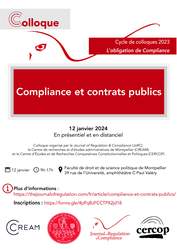
🌐follow Marie-Anne Frison-Roche on LinkedIn
🌐subscribe to the Newsletter MAFR Regulation, Compliance, Law
____
► Full Reference : M.-A. Frison-Roche, "Conclusion. Compliance et contrats publics : une alliance naturelle" ("Conclusion. Compliance and Public Contracts: a natural alliance"), in M.-A. Frison-Roche, C. Gilles & A. Oumedjkane (dir.), Compliance et contrats publics (Compliance and public contracts), Journal of Regulation & Compliance (JoRC), Centre de recherches et d’études administratives de Montpellier (CREAM) and Centre d’Études et de Recherches Comparatives Constitutionnelles et Politiques (CERCOP) of the Montpellier University, Faculté de droit et de science politique de Montpellier, 39 rue de l’Université, Amphiteatre C Paul Valéry, January 12, 2024
____
🧮see the full programme of this event
____
✏️read the notes taken on the spot to draw up the symposium conclusion
____
🌐consult on LinkedIn a general presentation of this event, which links to a presentation of each speech (in French)
____
🧱consult the co-organisation sheet of this event, giving an account of the various speakers
____
► English Summary of the conference: Firstly, it would appear that, as with all the contracts studied in the area of Compliance, public contracts are, for the public authorities or public companies, an instrument through which they implement the Compliance Obligation imposed on them by the laws and regulations. Public bodies involved in public contracts are particularly concerned because of the points of contact, even intimacy, between Compliance Law and the general interest. But the contract, whether public or private, remains in its classic conception what results from the expression of two wills which exchange their consents📎!footnote-3221.
Secondly, in terms of free will, public contracts can be the means by which public bodies and their co-contractors express their conception of what needs to be done to preserve the future, for example in environmental and social matters. On the contrary, the seemingly technical issue of exclusions from public contracts, whether they be automatic exclusions or optional exclusions, expresses the extent to which economically powerful players (public authorities, municipalities, public companies) take care of each other. In this respect, Compliance Law runs counter to Competition Law📎!footnote-3222 and profoundly affects Public Procurement Law.
But thirdly, the public contract, in that it expresses the general interest by its very nature, its ex ante nature reinforces regulatory action and the nature of Compliance as an extension of Regulation📎!footnote-3223. It appears to be the most appropriate instrument for this new branch of Law, without the need for it to be transformed. This underlines the extent to which Compliance Law must draw on classical Law, in this case Administrative Law.
Moreover, fourthly, the public contract appears to be the model for the Compliance Contract. The public contract is a model first of all because of the central place of the general interest. The "Monumental Goals" in which the substantive definition of Compliance Law is anchored📎!footnote-3224 are a development of this. Admittedly, this concern for the general interest drives the public entity, but the "raison d'être" of companies more generally also incorporates it through "governance", profoundly renewed by Compliance.
The public contract is also a model because the contract is handled by a powerful party, in this case the public entity. The subject of Compliance Law is the powerful company, and only that company, chosen because it is powerful and because it uses that power to achieve the Monumental Goals. In this respect, the "exorbitant powers" that characterise the public contractor are reconstituted either by Compliance laws or by stipulations, which confer on all obliged or voluntary companies - by virtue of CSR, which has many points of contact with Compliance Law as long as it is not confused with obeying the applicable regulations (which is what "conformity" is)📎!footnote-3225 - a power over the co-contractor, or even over third parties, equivalent to that of the public entity📎!footnote-3235.
The judge is the one who, through contractual litigation, both public and private, will bring to life these Monumental Goals desired by the State, carried by powerful entities (administration, companies), pledge of the Rule of Law📎!footnote-3228.
These include contractual mechanisms for information, audit, disclosure, control, collaboration, supervision, etc., through which the company, whether private or public, takes charge of the structure it has created, for example the value chain it masters📎!footnote-3226.
It can therefore be concluded that this logic of a public contract as an instrument of administrative action to achieve goals of general interest, now fully taken up in Compliance Law, must be acculturated into the Ordinary Contract Law and must be preserved in Public Contract Law, which presupposes a new balance with Competition Law, which for a long time carried within Public Law a contract model without concern for sustainability or the collective interest. To achieve this, dialogue between judges is essential. The Conseil d'État (French Council of State) and the Cour de cassation (French Court of cassation) set the example📎!footnote-3227.
____
📝This conference will be followed by an article, "The public contract, model of the Compliance Contract", which will be published in the book 📘Compliance and contract.
________
Dec. 12, 2023
Conferences

► Référence complète : M.-A. Frison-Roche, enregistrement et animation d'une série d'entretiens sur le Droit de la Compliance, in J.-Ph. Denis, Fenêtres ouvertes sur la gestion, Xerfi Canal, tenus le 12 décembre 2023, diffusés en 2024.
____
► Présentation générale de la série, comprenant les entretiens successifs : 🧱Compliance - un sujet de choix pour nouer Droit et Gestion : La distinction des disciplines est justifiée, le droit d'une part, la gestion d'autre part : c'est maltraiter la réalité que, notamment, de dissoudre l'une dans l'autre (ce que Jankélévitch appelait "la réduction par déplacement d'une discipline") car chacune doit conserver son ancrage.
Ceci posé, parce que la réalité ne se construit suivant les disciplines, si l'on veut rendre compte de celle-ci, ou au moins en tenir compte, par exemple de la réalité des entreprises, il faut que les disciplines se croisent.
La compliance est un parfait terrain pour cela.
Merci à Jean-Philippe Denis, professeur de gestion, qui est depuis toujours ouvert à ce dialogue, de l'avoir concrétisé plus encore, en permettant une série d'interviews à la croisée du Droit et de la Gestion sur le média Xerfi Canal.
____
Dans un premier temps, 4 discussions ont été tenues entre Jean-Philippe Denis et moi-même sur les thèmes suivants :
- 🎬sur la nécessité pratique de faire converger l'analyse juridique et l'analyse de gestionnaire lorsqu'il s'agit de comprendre, maîtriser, promouvoir la compliance.
- 🎬sur l'existence de différents systèmes de compliance selon les zones du mondes
- 🎬sur la "civilisation" de la Compliance
- 🎬sur le fait que la Vigilance est la pointe avancée de la Compliance
Puis, dans un second temps
- 🎬avec 🕴️Jean-Baptiste Racine sur la manière dont l'arbitrage international est apte aujourd'hui à défendre les Buts Monumentaux de la Compliance, notamment les droits humains et les impératifs environnementaux.
- 🎬avec 🕴️Stanislas Pottier de la façon dont les entreprises intègrent cet impératif de compliance, notamment dans sa dimension environnementale, participent à la construction européenne par cette voie, et arrivent à faire connaissance avec ce personnage assez nouveau pour elle, au moins en France : le juge (diffusé le 27 avril 2024) : cliquer ICI
- 🎬 avec 🕴️Roch-Olivier Maistre du rôle que joue l'Arcom dans le nouveau système numérique qui se met en place, et quelle articulation se noue entre la Régulation et la Compliance, notamment pour mesurer en quoi la Compliance est un outil utile pour assurer une meilleure supervision des plateformes en ligne et lutter ainsi plus efficacement contre les phénomènes de manipulation de l’information et de haine en ligne (diffusé le 16 mars 2024) : cliquer ICI
- 🎬avec 🕴️Eduardo Silva-Romero de l'importance grandissante de l'arbitrage international pour les entreprises, arbitrage qui intègre les intérêts des États et répond aux impératifs de Compliance (diffusé le 27 avril 2024) : cliquer ICI
- 🎬avec 🕴️Christophe Lapp de la nécessité pratique de ne pas confondre la Compliance avec la simple conformité, notamment lorsque le juge est saisi, les Buts Monumentaux étant intégrés dans son raisonnement (diffusé le 3 février 2024) : cliquer ICI
- 🎬avec 🕴️Jacques Beyssade du rapport entre la gouvernance et la Compliance, illustré dans une banque mutualiste et plus particulièrement dans le recrutement et la promotion des femmes à des postes de responsabilité (diffusé le 24 février 2024) : cliquer ICI
____
____
🔓consulter ci-dessous une présentation de chaque interview mené avec un expert en Droit sur un sujet particulier de Droit de la Compliance⤵️
Dec. 5, 2023
Conferences
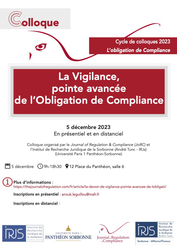
🌐suivre Marie-Anne Frison-Roche sur LinkedIn
🌐s'abonner à la Newsletter MAFR Regulation, Compliance, Law
____
► Référence complète : M.-A. Frison-Roche, "Articulation systémique entre Vigilance, Due Diligence, conformité et Compliance", in M. Mekki, M.-A. Frison-Roche et J.-Ch. Roda (dir.), La vigilance, pointe avancée de l'obligation de Compliance, Journal of Regulation & Compliance (JoRC) et Institut de Recherche Juridique de la Sorbonne (André Tunc - IRJS), Université Paris 1 Panthéon-Sorbonne, 12 place du Panthéon, salle 6, 5 décembre 2023.
____
🧮consulter le programme complet de cette manifestation
____
🚧lire le document de travail bilingue sur la base duquel la conférence a été élaborée
____
consulter les slides accompagnant la conférence
____
► Résumé de la conférence :
____
Cette conférence sera suivie d'un article qui sera publié dans l'ouvrage L'obligation de Compliance.
________
Nov. 30, 2023
Conferences
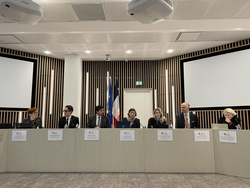
🌐follow Marie-Anne Frison-Roche on LinkedIn
🌐subscribe to the Newsletter MAFR Regulation, Compliance, Law
____
► Full Reference: M.-A. Frison-Roche, "Conclusion", in M. Boissavy, H. Dehghani-Azar, and M.-A. Frison-Roche (dir.), Journal of Regulation & Compliance (JoRC) and Conseil national des Barreaux (CNB), Compliance, vigilance et médiation (Compliance, Vigilance and Mediation), Amphitheatre of the Conseil national des Barreaux, November 30, 2023.
____
🧮see the full programme of this event
________
Nov. 17, 2023
Publications
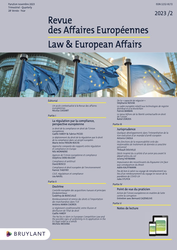
🌐follow Marie-Anne Frison-Roche on LinkedIn
🌐subscribe to the Newsletter MAFR Regulation, Compliance, Law
____
► Full Reference: M.-A. Frison-Roche, "The deployment of Regulatory Law through Compliance Law in the European project", in G. Hardy & F. Picod, Compliance Regulation from a European Perspective, Law and European Affairs (L.E.A.), 2023/2, pp. 345-352.
____
🚧read the bilingual Working Paper which is the basis of this article, with additional developments, technical references and hyperlinks
____
► English Summary of the article: Compliance Law is neither a method of obeying regulations, nor a simple neutral method of ensuring the effectiveness of norms, nor a means of enforcement displaced from Ex Post to Ex Ante. It is an extension of Regulatory Law and goes beyond it. Like it, it aims to build spaces according to a political project specific to an area, such as Europe. Branch of Law looking to the future as Regulatory Law does, it constructs and maintains, in a systemic way, sustainable, albeit unstable, balances to achieve the ‘Monumental Goals’ in which its normativity resides: security, sustainability, probity, truth, and dignity. By internalising these Monumental Goals in the companies that are in a position to achieve them, the “crucial companies”, Compliance Law preserves the logic of Regulatory Law, offering it a prodigious expansion since it frees it from the condi- tion of a sector and territorial borders, which seemed tautological, by associating private powers and public will, which remains primary. In this way, Compliance can regulate the digital space and climate issue through political choices made by a sovereign Europe.
________
Nov. 15, 2023
Editorial responsibilities : Direction of the collection "Cours-Série Droit privé", Editions Dalloz (33)
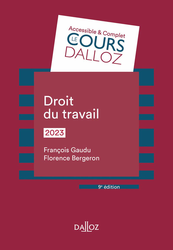
► Référence générale : F. Gaudu et F. Bergeron-Canut, Droit du travail, Dalloz, coll. "Cours Dalloz-Série Droit privé", 10ième éd., 2024, 686 p.
____
► Présentation de l'ouvrage : Ce manuel à jour des derniers textes s'adresse à tous les étudiants en droit et à tous les praticiens qui actualisent leurs connaissances.
Il développe dans une première partie les " relations individuelles de travail " (formation du rapport contractuel, exécution et rupture du contrat de travail), pour consacrer sa seconde partie aux " relations collectives de travail ", (conflits collectifs du travail, représentation et la négociation collective et convention collective de travail).
____
►dans la même collection, consulter les Cours complémentaires de celui-ci :
🕴️F. Kessler 📕 Droit de la protection sociale.
🕴️S. Piedelièvre,V. Magnier, 📕Droit des sociétés
____
📚Consulter l'ensemble de la collection dans laquelle le Cours est publié.
________
Nov. 9, 2023
Publications

♾️follow Marie-Anne Frison-Roche on LinkedIn
♾️subscribe to the Newsletter MAFR Regulation, Compliance, Law
____
► Full Reference: M.-A. Frison-Roche, "Reinforce the Judge and the Lawyer to impose Compliance Law as a characteristic of the Rule of Law", in M.-A. Frison-Roche (ed.), Compliance Jurisdictionalisation, Journal of Regulation & Compliance (JoRC) and Bruylant, coll. "Compliance & Regulation", to be published.
____
📝read the article
____
🚧read the bilingual Working Paper which is the basis of this article, with additional developments, technical references and hyperlinks
____
📘read a general presentation of the book, Compliance Jurisdictionalisation, in which this article is published
____
► This article is the introduction of the book.
► Summary of the article (done by the Journal of Regulation & Compliance): One can understand that the compliance mechanisms are presented with hostility because they seem designed to keep the judge away, whereas there is no Rule of Law without a judge. Solid arguments present compliance techniques as converging towards the uselessness of the judge (I). Certainly, we come across magistrates, and of all kinds, and powerful ones, but that would be a sign of imperfection: its ex-ante logic has been deployed in all its effectiveness, the judge would no longer be required... And the lawyer would disappear so with him...
This perspective of a world without a judge, without a lawyer and ultimately without Law, where algorithms could organize through multiple processes in Ex Ante the obedience of everyone, the "conformity" of all our behaviors with all the regulatory mass that is applicable to us, supposes that this new branch of Law would be defined as the concentration of processes which gives full effectiveness to all the rules, regardless of their content. But supposing that this engineer's dream is even achievable, it is not possible in a democratic and free world to do without judges and lawyers.
Therefore, it is imperative to recognize their contributions to Compliance Law, related and invaluable contributions (II).
First of all, because a pure Ex Ante never existed and even in the time of the Chinese legists📎!footnote-2689, people were still needed to interpret the regulations because a legal order must always be interpreted Ex Post by who must in any case answer the questions posed by the subjects of law, as soon as the political system admits to attributing to them the right to make claims before the Judge. Secondly the Attorney, whose office, although articulated with the Judge's office, is distinct from the latter, both more restricted and broader since he must appear in all cases where the judicial figure puts himself in square, outside the courts. However, Compliance Law has multiplied this since not only, extending Regulatory Law, it entrusts numerous powers to the administrative authorities, but it also transforms companies into judges, in respect of which the attorneys must deal with.
Even more so, Compliance Law only takes its sense from its Monumental Goals📎!footnote-2690. It is in this that this branch of the Law preserves the freedom of human beings, in the digital space where the techniques of compliance protect them from the power of companies by the way that the Compliance Law forces these companies to use their power to protect people. However, firstly, it is the Judges who, in their diversity📎!footnote-2691, impose as a reference the protection of human beings, either as a limit to the power of compliance tools📎!footnote-2692 or as their very purpose. Secondly, the Attorney, again distinguishing himself from the Judge, if necessary, reminds us that all the parties whose interests are involved must be taken into consideration. In an ever more flexible, soft and dialogical Law, everyone presenting himself as the "advocate" of such and such a monumental goal: the Attorney is legitimate to be the first to occupy this place.
________
Nov. 9, 2023
Publications
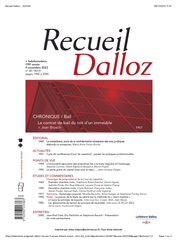
🌐follow Marie-Anne Frison-Roche on LinkedIn
🌐subscribe to the Newsletter MAFR Regulation, Compliance, Law
____
► Full Reference: M.-A. Frison-Roche, "La compliance, socle de la confidentialité nécessaire des avis juridiques élaborés en entreprise" ("Compliance, the cornerstone of the confidentiality required for in-house legal opinions"), D. 2023, p.
____
📝read the article (in French)
____
► English Summary of the article: The French Law about the Ministry of Justice's 2023-2027 Orientation and Programming ("loi d'orientation et de programmation du ministère de la justice 2023-2027") had introduced into the French legal system the confidentiality of in-house lawyers' opinions (before the French Constitutional Council, on a question of parliamentary procedure, annulled this disposition, thus leaving the question still open).
This development is necessary in order to respond to the injunction for companies to comply more and more with the regulations, which is itself only one of the tools of a wider movement: Compliance Law.
This branch of the law, notably through the French so-called Sapin 2 Act of 2016, the French Vigilance Act of 2017 and the European Digital Services Act (DSA), requires companies to implement the necessary means to satisfy the Monumental Goals contained in the laws or regulations. This presupposes, firstly, that companies have information (via alerts, risk mapping, vigilance, sustainability reports, etc.), enabling them to identify their conformity and non-conformity, so that they can, secondly, take effective action to put an end to current breaches, prevent future breaches and achieve the goals set by the Legislator.
This Compliance System requires that the information made available to managers is reliable and honest. However, if non-conformity is not analysed and communicated in a way that is protected by confidentiality, the company will prefer not to know about it and will therefore be unable to take appropriate action, which will deprive the social community of its power to act in the future. This is why the confidentiality of in-house lawyers' opinions is based on the very definition of Compliance Law itself.
________